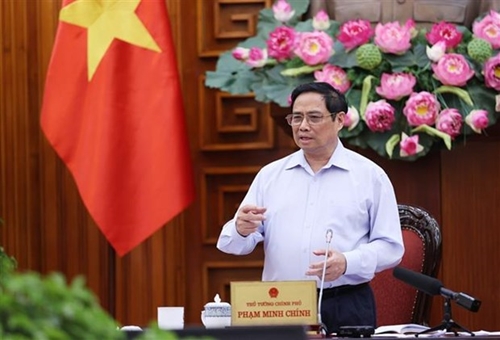Explaining the drug and medical supply shortages in some localities and central-level hospitals, the Ministry of Health (MoH) pointed to the COVID-19 pandemic, whose serious impacts in 2020 and 2021 led to the scarcity of materials for production and surged prices and subsequently made it more difficult to purchase medicine and medical supplies.
    |
 |
|
Prime Minister Pham Minh Chinh speaks at the meeting in Hanoi on June 23. |
Notably, it noted, some localities and establishments are afraid that they may commit wrongdoings or undergo examination and inspection, so they didn’t dare to buy supplies.
In addition, resignation among health workers in the public sector has increased, the MoH said, blaming that on low salaries and allowances in the public health network, especially preventive medicine and grassroots health facilities, as well as high pressure, especially since the COVID-19 pandemic broke out.
PM Chinh requested relevant ministries and sectors to have a through grasp of the situation, analyse causes, and coordinate closely with each other to deal with the situation in a timely and effective manner.
He said the successful containment of COVID-19 has helped recover and develop the economy and society fast and sustainably. However, the pandemic remains complex in some countries while other outbreaks like dengue fever, monkeypox, and hand-foot-mouth disease have made the situation more complicated, the leader stressed.
Therefore, apart from increasing the anti-COVID-19 capacity, it is also necessary to reserve drugs, medical supplies, and manpower for coping with other outbreaks and providing healthcare services for people, he said.
Stressing that caring for and protecting people’s health is the first and foremost task, PM Chinh told the MoH to work with relevant agencies to review mechanisms, policies, and regulations on drug and medical supply procurement while actively dealing with obstacles.
He ordered ensuring transparency and preventing negative phenomena, corruption, and group interests in the tendering process; enhancing management in the health and pharmaceutical sector; simplifying drug authorization procedures; boosting power decentralization in drug and medical supply procurement; and increasing examination and supervision.
Regarding the resignation, the Government leader asked for overhauling regulations on the health sector’s apparatus and manpower, perfecting the rules on public - private partnership in the area, and pressing on with the practice of autonomy at public health establishments.
He also demanded relevant agencies re-assess the manpower imbalance among localities, medical facilities at different levels, and specialized branches to work out solutions while making plans to arrange sufficient personnel for medical examination and treatment in a scientific, rational, and effective manner.
Source: VNA